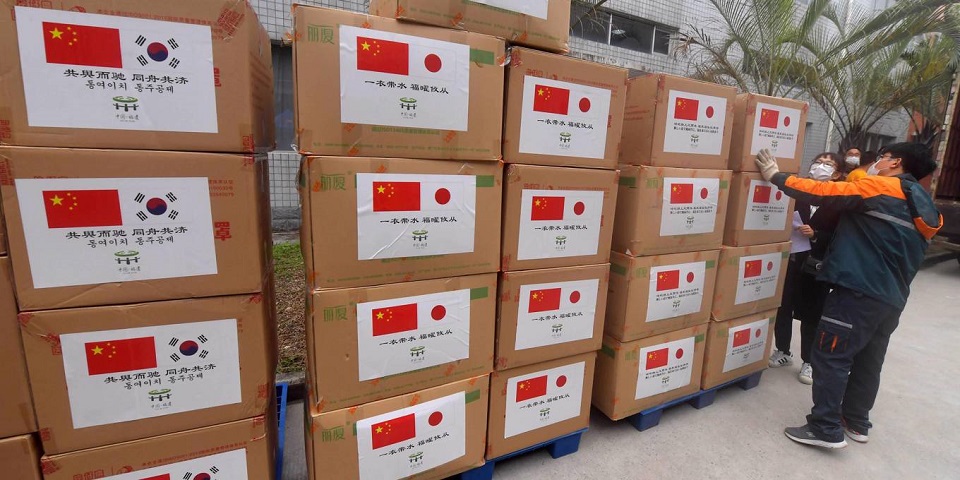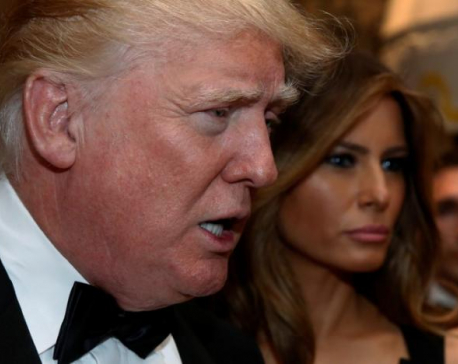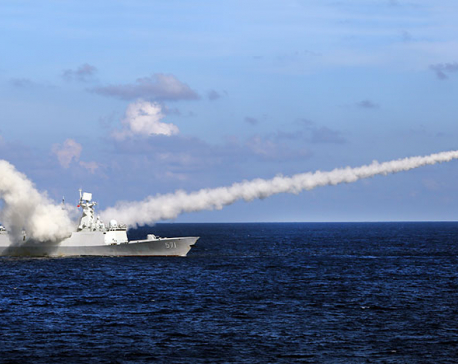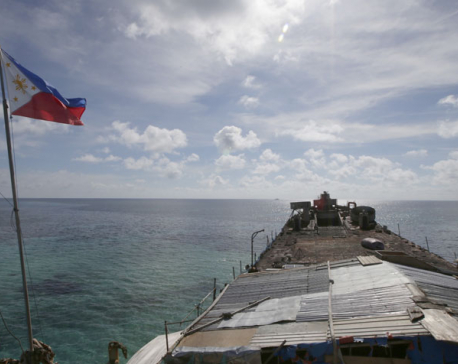
OR

Every major global crisis of the last 20 years has been an opportunity for China to strengthen its diplomatic relationships
BEIJING – When he welcomed US President Donald Trump to Beijing’s Forbidden City in 2017, Chinese President Xi Jinping pointed to the character “peace” in the names of all three halls of the great complex, emphasizing the Confucian maxim “Peace is prized above all.”
The world needs to adhere to that idea now more than ever, but its two leading powers are at loggerheads at the worst possible time. Anti-Chinese sentiment permeates American society, and a popular saying in China these days is that if you are not angry at America, you are not patriotic.
Sino-American tensions have become so severe that it can seem as if only an attack on Earth by extra-terrestrials could ease them. Seen from this perspective, perhaps we ought to regard the COVID-19 pandemic as the attack we need. Rather than continuing to engage in a blame game and finger-pointing, which accomplish nothing, China and the United States should be collaborating to find a vaccine or a cure.
The COVID-19 crisis offers both countries a possible path from recrimination to reconciliation. In particular, the pandemic gives China a rare opportunity to address its strategic dilemmas as a rising power, above all its struggle to win the trust of the US and other leading powers. Through actions rather than words, China’s leaders can rebuild the country’s international image on the basis of a moral imperative rather than geopolitical interests.
The world suddenly finds itself mired in a health crisis, an economic crisis, and a liquidity crisis. As a result, many economies are facing the prospect of a downturn on the scale of the Great Depression of the 1930s, rather than the Great Recession of 2009.
One central lesson from the Great Depression is that rich-country governments sparked global protectionism with measures such as the US Smoot-Hawley Tariff Act and Britain’s Abnormal Importations Act, which contributed to the sharp slowdown in trade and capital movements. In fact, such “every country for itself” policies are invariably the ultimate culprit behind any global economic crisis.
Every major global crisis of the last 20 years has been an opportunity for China to strengthen its diplomatic relationships. US Presidents George W. Bush and Barack Obama both labeled China as America’s chief rival and competitor. But in each case, China managed to turn the situation around—first by collaborating on anti- terrorism programs following the September 11, 2001, attacks on the US, and then by helping to stimulate global demand and calm financial markets in the wake of the 2008 global financial crisis.
Similarly, during the eurozone debt crisis, China strengthened its ties with Europe by purchasing Greek, Portuguese, and Spanish bonds. It also boosted imports from Europe and increased investments there.
By helping to lead the global response to the COVID-19 crisis, China can turn its defensive, reactive stance toward the US into a more open, proactive one. Fortunately, China’s leaders understand both the challenge and the opportunity before them.
For starters, the US has limited capacity to produce the swabs, ventilators, face masks, and protective gear that its hospitals need. China should therefore offer to send supplies and equipment, and share its data and clinical experiences regarding COVID-19. In addition, China should guarantee the continued operation of its medical supply chains and resist any temptation to cut off exports of essential inputs such as pharmaceuticals and vitamins to the US, as some Chinese have suggested.
Second, China can be an anchor for global demand and a source of critical supplies, because Chinese businesses are now springing back to life as the country prepares to exit its lockdown. By stabilizing global supply chains and helping to maintain the flow of goods wherever it can, China can quietly refute the “decoupling” narrative that has begun to take hold.
Such efforts are particularly important at a time when COVID-19 threatens the consummation of the recent China-US “phase one” trade deal. Although China pledged as part of the agreement to buy $12.8 billion worth of US services in 2020, tourism was meant to account for much of that.
Moreover, demand for certain goods will not be met from China, while some other goods will not be produced in America, leading to shortages. The pandemic thus gives both countries a convenient excuse to hold off on further tariff hikes and give each other some breathing space.
Third, China should provide financial assistance to developing countries, which typically are left in the lurch during global economic downturns. The International Monetary Fund lacks the resources to be a major lender or liquidity provider, while the world’s leading central banks offer swap facilities mostly to one another. It was the People’s Bank of China that provided rescue packages and took on credit risk to help Portugal, Argentina, and Egypt during their respective financial crises.
Finally, as China’s leaders seize this opportunity to revive relations with the US, private actors in both countries also are working together. US and Chinese medical companies are cooperating to produce and distribute COVID-19 test kits. And Harvard University scientists will collaborate with Chinese researchers—including Zhong Nanshan, the renowned epidemiologist who first identified the SARS virus —in a five-year, $115 million coronavirus research program funded by a Chinese real-estate company.
If there is one lesson that China should share with the world, it is that speed, transparency, accuracy, and scientific reliability are of the utmost importance when communicating about the COVID-19 crisis. A pandemic is no time to tout the superiority of any country’s governance system or approach, let alone compete for global dominance. China should quietly win trust by helping the US and other countries, not out of strategic interest, but on moral grounds.
Keyu Jin, Professor of Economics at the London School of Economics, is a World Economic Forum
Young Global Leader
Copyright: Project Syndicate, 2020.
www.project-syndicate.org
You May Like This

Chinese state tabloid warns Trump, end one China policy and China will take revenge
SHANGHAI/TAIPEI, Jan 9: State-run Chinese tabloid Global Times warned U.S. President-elect Donald Trump that China would "take revenge" if he reneged... Read More...

China announces South China Sea military exercises
BEIJING, July 18: China said Monday that it is closing off a part of the South China Sea for military exercises... Read More...

South China Sea ruling deepens tensions between US, China
WASHINGTON, Jul y 10: A landmark international tribunal ruling on the South China Sea threatens to sharpen the differences between... Read More...




Just In
- MoHP cautions docs working in govt hospitals not to work in private ones
- Over 400,000 tourists visited Mustang by road last year
- 19 hydropower projects to be showcased at investment summit
- Global oil and gold prices surge as Israel retaliates against Iran
- Sajha Yatayat cancels CEO appointment process for lack of candidates
- Govt padlocks Nepal Scouts’ property illegally occupied by NC lawmaker Deepak Khadka
- FWEAN meets with President Paudel to solicit support for women entrepreneurship
- Koshi provincial assembly passes resolution motion calling for special session by majority votes








_20220508065243.jpg)






Leave A Comment